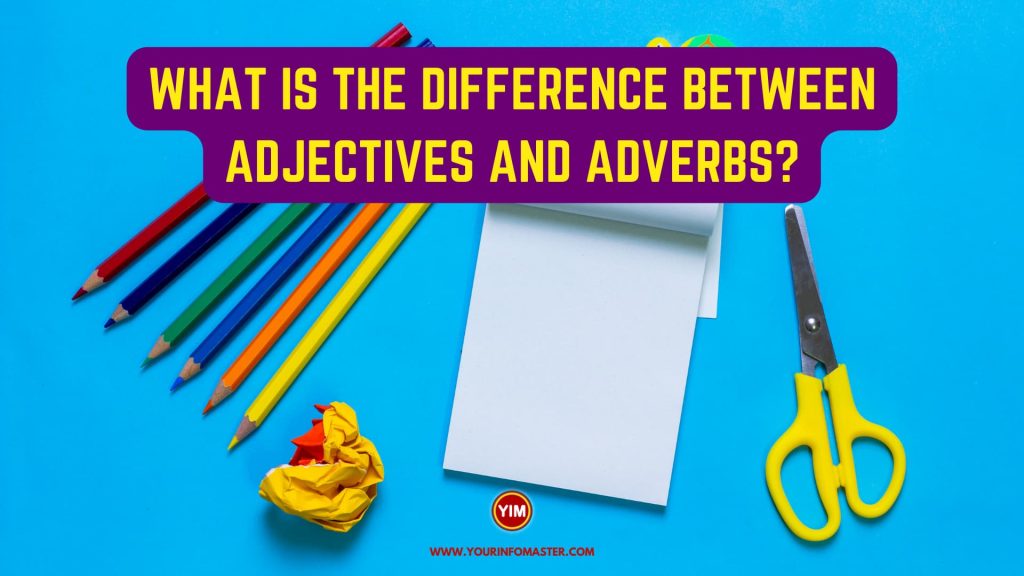I am going to explain the blog post “What is the difference between Adjectives and Adverbs?“
In the realm of language, understanding the nuances between different parts of speech is crucial. One such distinction lies between adjectives and adverbs. These two grammatical elements play distinct roles in modifying and enhancing our language.
In this blog post, we will explore the key differences between adjectives and adverbs, shedding light on their unique characteristics and functions. So let’s dive in and unravel the intricacies of these language components!
Check also: What’s the Difference between TSA Pre and Global Entry?
5 Differences between Adjectives and Adverbs
Here is a list of five essential differences between adjectives and adverbs, highlighting their distinct features and usage in language construction.
List of 5 differences between Adjectives and Adverbs:
- Descriptive Nature vs. Action Modification
- Placement in Sentence Structure
- Comparative and Superlative Forms
- Conversion Possibilities
- Verb Modification and Intensity
Check also: What is the Difference Between HELOC and Home Equity Loan?
Detail of 5 Differences between Adjectives and Adverbs
Here is the detail of 5 differences between Adjectives and Adverbs:
Descriptive Nature vs. Action Modification: Adjectives primarily function to describe or provide information about nouns or pronouns. They convey attributes such as color, size, shape, and more. Adverbs, on the other hand, modify verbs, adjectives, or other adverbs, indicating how, when, where, or to what extent an action is performed. While adjectives focus on the descriptive aspect, adverbs deal with action modification.
Placement in Sentence Structure: Adjectives typically appear before the noun or pronoun they modify. For example, “the beautiful garden” or “a small puppy.” Adverbs, however, can be placed in various positions within a sentence, depending on the information they provide. They can occur before a verb (“quickly run”), after a verb (“run quickly”), or at the beginning or end of a sentence (“Quickly, run!” or “Run quickly!”).
Comparative and Superlative Forms: Adjectives can express degrees of comparison using comparative and superlative forms. For instance, “tall, taller, tallest.” Adverbs also have comparative and superlative forms, allowing for the expression of various degrees of intensity or manner. Examples include “quickly, more quickly, most quickly” or “carefully, more carefully, most carefully.”
Conversion Possibilities: Adjectives can often be converted into adverbs by adding the suffix “-ly.” For example, “quick” (adjective) becomes “quickly” (adverb). However, not all adverbs are formed by adding “-ly” to an adjective. Some adverbs retain their original form. For instance, “fast” is an adverb as well as an adjective. This distinction provides flexibility in constructing sentences with varying levels of precision and clarity.
Verb Modification and Intensity: While adjectives mainly modify nouns, adverbs modify verbs, adjectives, or other adverbs. Adverbs provide additional information about the action, describing how it is performed or the intensity with which it occurs. Examples of verb modification include “run quickly” or “speak softly.” Adverbs also modify adjectives or other adverbs, as in “very tall” or “extremely well.”
Check also: What is the difference between hypertension and high blood pressure?
Conclusion
In conclusion, understanding the differences between adjectives and adverbs is vital for effective language usage. Adjectives enhance our descriptions of nouns, while adverbs provide insights into actions, intensities, and manners. Recognizing the distinct roles these language components play allows us to communicate more precisely and expressively, enriching our interactions and written expression.
See also: What is the difference between Medicare A and B?
If you really enjoyed the article “What is the difference between Adjectives and Adverbs?,” then I would be very grateful if you’d help it spread by emailing it to your friends or sharing it on Twitter, Instagram, or Facebook. Thank you!
Have you read “What is the difference between Adjectives and Adverbs?“ Which of these blogs are you reading, and how is it similar to one of them?

